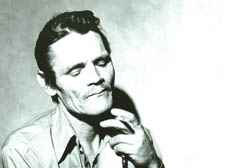|
|
 |
| |

Let's Get Lost - the story of Jazz trumpeter Chet Baker |
Camden cinema | Let's Get Lost movie review| Chet Baker jazz trumpeteer | Heroin | Dustbowl | American Great Depression
LET'S GET LOST
Directed by Bruce Weber
Certificate 15
JAZZ trumpeter Chet Baker’s life feels like a Jack Kerouac novel, and director Bruce Weber uses this fact to lay across the screen snapshots of classic Americana: fins on the tailends of convertibles, dysfunctional families living in trailer parks, cowboy boots and checked shirts.
And Baker’s life spanned the great years of American culture. It allows Weber, unintentionally, to use his subject as a means to tell the story of a post-war generation. Baker’s contemporaries were those whose early lives were blighted by the poverty of the Depression, whose experience as young men was punctuated by a European war, and whose return to a victorious nation was curtailed by few opportunities to share in its success.
If it was not for an incredible ear, Chet could easily have been one of the minor characters in Kerouac’s On The Road.
Chet was the son of an Okie – his was a Steinbeck childhood. His family fled the Dustbowl to find a new life in the west. His father was a guitarist, and gave Chet a trombone. Little Baker’s arms were too short to manage the top notes, so they swapped it for a trumpet. Within two weeks, and with nothing more than an hour-long jazz radio show as a teacher, Chet was playing the instrument that would make him world famous.
There are two marvellous images that run concurrently through the film. The first is Chet’s half-moon-shaped face in the 1950s. He was intensely handsome, quiffed-up and James Dean-like. Fast forward 40 years and you see the toll heroin has taken on the face, as well as the soul. His visage is still intense and interesting, but rather than admire, you can’t help stare at the crags and crevices that are etched down the cheeks and forehead.
There are problems with the film and a major falling is the soundtrack. I expected a happy couple of hours of listening to his greatest hits, but because of the chaotic nature of Chet’s business dealings, Weber was not allowed to use many of his best-known numbers.
And too often the director attempts to turn this documentary into an Athena postcard. We have painfully long shots of a model friend prancing about on a beach, shaking her hair moodily and thrusting her curves at the lens.
But, above all, this is a story of drug abuse. Heroin robbed him of the means to harness his exceptional ability, his life cut short when he died aged 58 after falling from an Amsterdam hotel window. He talks candidly about drink and drugs, explaining to camera that a Speedball was his favourite buzz, as long as “I get the right amount of cocaine – not too much or you don’t feel the heroin”.
If you have a passing interest in jazz, you will love this film, but at two hours it may be a stretch for the non-jazz heads.
And these American musicians seem to take themselves very seriously when compared to their British, Dixieland-playing counterparts: can you imagine a bio-pic of Humphrey Lyttleton being so short on jokes, and so tragic to watch? |
 |
|
 |
| |
|
 |
|

